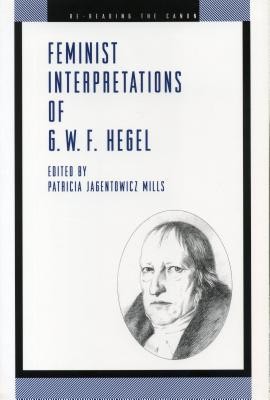
- We will send in 10–14 business days.
- Publisher: Penn State University Press
- ISBN-10: 0271014911
- ISBN-13: 9780271014913
- Format: 15.4 x 22.8 x 2.7 cm, minkšti viršeliai
- Language: English
- SAVE -10% with code: EXTRA
Feminist Interpretations of G. W. F. Hegel (e-book) (used book) | bookbook.eu
Reviews
Description
A pivotal figure in critical theory and the modern/postmodern debates, G. W. F. Hegel is the subject of differing feminist critiques. Going beyond and behind Simone de Beauvoir's creative appropriation of Hegel in The Second Sex, the essays gathered together here think both with and against the grain of Hegel's dialectical theory through the lens of gender issues found in his philosophy. Some of the authors focus on prominent passages on woman and the feminine in Hegel's work, while others argue that it is interpretations of the margins of his text that are most telling. Hegel articulates one of the central questions with which political feminists are concerned: how to conceptualize identity and difference. A point of contention among the authors is whether or not Hegel's speculative system, with its "reconciliation" of identity and difference, "answers" this question. Contributors include the French philosopher Luce Irigaray, the Italian feminist Carla Lonzi, and the Canadian theoretician Mary O'Brien, along with Seyla Benhabib, Patricia Jagentowicz Mills, David Farrell Krell, Frances Olsen, Naomi Schor, Eric O. Clarke, Carole Pateman, Heidi M. Ravven, Alison L. Brown, and Shari Neller Starrett. Read together, the articles stress the transgressive nature of feminist theory as it challenges disciplinary boundaries; they are the articulation of the many different strategies and positions of the "vigorous debate" that defines feminist theory today.
EXTRA 10 % discount with code: EXTRA
The promotion ends in 22d.04:35:03
The discount code is valid when purchasing from 10 €. Discounts do not stack.
- Publisher: Penn State University Press
- ISBN-10: 0271014911
- ISBN-13: 9780271014913
- Format: 15.4 x 22.8 x 2.7 cm, minkšti viršeliai
- Language: English English
A pivotal figure in critical theory and the modern/postmodern debates, G. W. F. Hegel is the subject of differing feminist critiques. Going beyond and behind Simone de Beauvoir's creative appropriation of Hegel in The Second Sex, the essays gathered together here think both with and against the grain of Hegel's dialectical theory through the lens of gender issues found in his philosophy. Some of the authors focus on prominent passages on woman and the feminine in Hegel's work, while others argue that it is interpretations of the margins of his text that are most telling. Hegel articulates one of the central questions with which political feminists are concerned: how to conceptualize identity and difference. A point of contention among the authors is whether or not Hegel's speculative system, with its "reconciliation" of identity and difference, "answers" this question. Contributors include the French philosopher Luce Irigaray, the Italian feminist Carla Lonzi, and the Canadian theoretician Mary O'Brien, along with Seyla Benhabib, Patricia Jagentowicz Mills, David Farrell Krell, Frances Olsen, Naomi Schor, Eric O. Clarke, Carole Pateman, Heidi M. Ravven, Alison L. Brown, and Shari Neller Starrett. Read together, the articles stress the transgressive nature of feminist theory as it challenges disciplinary boundaries; they are the articulation of the many different strategies and positions of the "vigorous debate" that defines feminist theory today.


Reviews